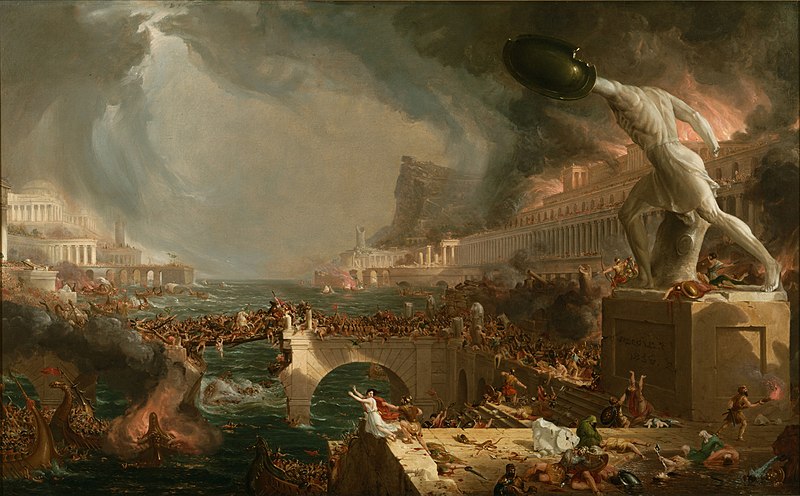As both a foreigner and a reactionary, it's interesting to see the American founding myths in all their peculiar detail. Identifying the nonsense stories other people accept uncritically about their own history is much easier than identifying one's own. The US ones are particularly interesting to me - I have a strong fondness for this country, but I still view it as as an outsider, as a) I came across this stuff much later in life, and b) my summary of the American Revolution in one sentence is "the bad guys won". Incidentally, this would make a great tagline for a future reactionary version of the play, 'Hutchinson: The Musical".
Of course, if you want to get the record set straight, Moldbug is of course the best source. And with a little of the alternative perspective on the matter, the most interesting thing about the play is what gets left out.
The second most neglected perspective in the history of American Revolution is the Loyalists. For the most part, they simply don't exist. "America" was fighting King George. The fact that there were substantial numbers of native-born Americans who were philosophically and practically opposed to the War of Independence gets mostly elided. How many, exactly? Hard to say. I've seen numbers floated around as being 20%, but this doesn't mean that 80% were Patriots, as a large number were on the fence. I'd take all these numbers with a grain of salt.
The musical actually does better than I expected - there's one scene where a Loyalist is giving a speech in opposition to the Congress (unpersuasively, of course) , and he then gets mocked by Hamilton. That they don't present a good case for the opposition is not surprising - that they acknowledge the opposition existed, and was American, was frankly a pleasant surprise.
So the Loyalists, uncharacteristically, weren't the Elephant in the Room being ignored here. What was, then? What is the faction you almost never hear about in the re-telling of the American Revolution?
The answer is simple: British Parliament.
Britain in the musical, like in nearly all popular retellings, is represented by King George III. He is depicted as being in charge of the whole affair, pulling all the strings from across the sea. It's like the whole musical, like the country itself, lives in a bizarre alternative universe where the Cavaliers somehow won the English Civil War. In reality, the issue had been decided twice, first with King Charles being separated from his head, and then in case the message hadn't been received, again with the Glorious Revolution chasing King James II out of England, all the way to France in fact. By the time of the American Revolution, the verdict had been in for over a century - when push came to shove, Parliament was in charge.
But you can see clearly why this very quickly becomes awkward for the standard narrative. The American revolution was about establishing democracy (praise be upon it) for the first time ever! Except that the government being overthrown was in fact democratic, in various different forms, from at least 1215 onwards. Quite a pickle, no?
Aha, the apologists respond, but there was no democratic representation among the Americans. No taxation without representation, and all that. What an injustice! I'll let Mr Hutchinson field this one:
The Assembly of Massachusetts Bay, therefore, was the first that took any publick of the Act, and the first which ever took exception to the right of Parliament to impose Duties or Taxes on the Colonies, whilst they had no representatives in the House of Commons. This they did in a letter to their Agent in the summer of 1764, which they took care to print and publish before it was possible for him to receive it. And in this letter they recommend to him a pamphlet, wrote by one of their [6] members, in which there are proposals for admitting representatives from the Colonies to fit in the House of Commons.
I have this special reason, my Lord, for taking notice of this Act of the Massachusetts Assembly; that though an American representation is thrown out as an expedient which might obviate the objections to Taxes upon the Colonies, yet it was only intended to amuse the authority in England; and as soon as it was known to have its advocates here, it was renounced by the colonies, and even by the Assembly of the Colony which first proposed it, as utterly impracticable.In other words:
Massachusetts: No Taxation without Representation!
Britain: Hmm. Would you like some representation then?
Massachusetts: No, absolutely not, it would never work!
Comedy gold.
So if the big injustice that Alexander Hamilton was fighting against wasn't really a lack of democratic representation, what exactly was it?
Beats me. Beats Hutchinson too.
And this is the odd sense that comes after all the great songs are over. It's the same feeling I had years ago watching Michael Moore documentaries. In the moment, the strange web of narrative seems oddly compelling, until you leave the theatre and try to distill it into a sentence. And lo and behold, the main thesis is that Dylan Klebold and Eric Harris shot up a school because Lockheed Martin had a factory somewhere nearby making parts for satellites. Phrased thus, you realise that this is an insane argument, and you can't believe you fell for it in the first place.
That's where I get to on Hamilton. Once you leave the theatre, odd reactionary thoughts come back in. You mean he was a hardworking immigrant who loved his newfound country so much that he... immediately worked to overthrow its government? Hmm, that doesn't sound so good. Wait, no, he was a poor penniless orphan who wanted to rise up the ranks, and so he realised that helping foment a war and rising up the command would be a great way to do this? Wait, that even worse. Much worse, actually.
The final thought, however, that the honest foreigner must admit to himself, is this: I wonder what equivalent stupidity I've believed about my own history?
Truthfully, I don't quite know. But if I figure it out, I'll let you know.







